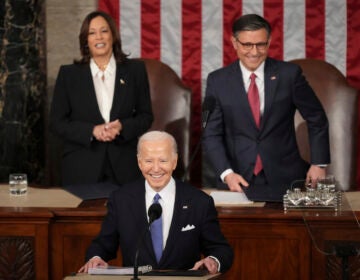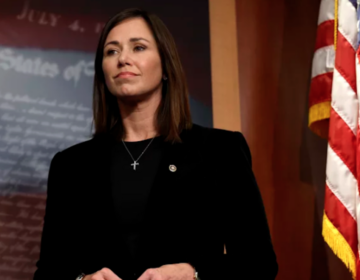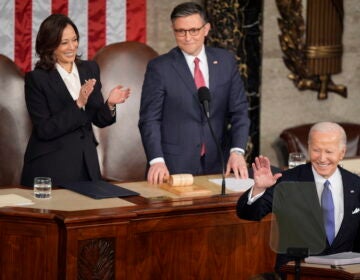Abortion, infrastructure and ‘tax fairness’: What to expect from Biden’s State of the Union address
The White House offered WHYY News a sneak peek of Biden's third State of the Union speech.
Listen 1:11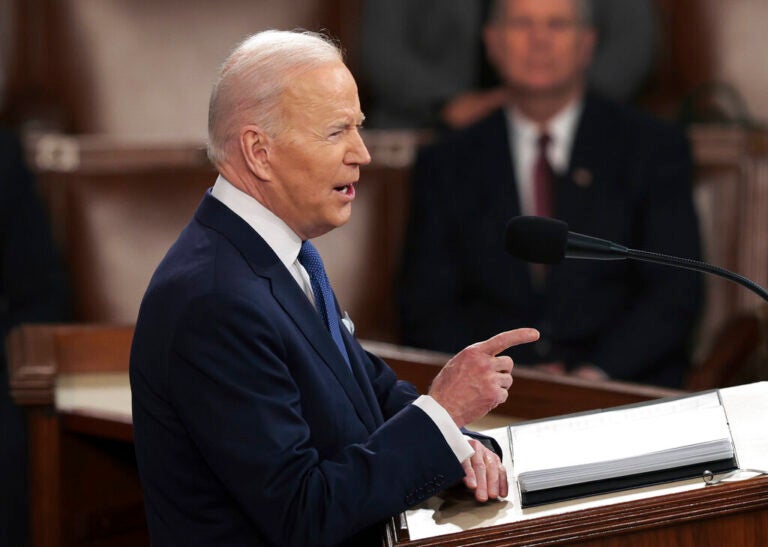
File photo: President Joe Biden delivers his State of the Union address to a joint session of Congress at the Capitol, Tuesday, March 1, 2022, in Washington. (Win McNamee, Pool via AP)
What you need to know
- President Joe Biden will deliver his third State of the Union address starting at 9 p.m. Thursday
- U.S. Rep. Dwight Evans, who represents parts of Philadelphia, and Philly Mayor Cherelle Parker are among those who will be in attendance
- Sen. Katie Britt (R-AL) will deliver the opposing party’s response, and Trump has promised to provide “LIVE, Play by Play” commentary on Biden’s speech
- Watch or listen to the address on WHYY.org, the WHYY App, WHYY-FM 90.9 or WHYY-TV
President Joe Biden will be giving his State of the Union address to Congress Thursday. WHYY News visited the White House earlier this week to learn more about what the president will discuss and what it means for Pennsylvanians.
While officials could not say what would be in the final draft, the top candidates for inclusion in the annual speech include the economy, “tax fairness,” prescription drug prices, reproductive rights, President Biden’s “Unity Agenda,” housing affordability, attacking junk fees, expanding small business opportunities and the environment.
The economy and the Investing in America Plan
Biden’s Investing in America Plan is a collection of bills signed into law, including the American Rescue Plan, Bipartisan Infrastructure Law, CHIPS and Science Act, and Inflation Reduction Act. The White House has said that the goal of the plan is to create high-paying union jobs that do not require a degree nationwide while also investing in infrastructure and green energy projects.
This includes billions of dollars in funding public projects and private sector investments in Pennsylvania and would provide necessary financing for Governor Josh Shapiro’s recent budget proposal that is heavy on infrastructure and education spending. For example, local projects include the rehabilitation of the Martin Luther King Drive Bridge and accessibility and safety enhancements around schools in North Philadelphia.
“These are focused, place-based investments that are trying to obviously mirror the needs of respective communities,” Steve Benjamin, director of public engagement and senior advisor to the president, told WHYY News. “There will be some more announcements coming to Philadelphia under the infrastructure bill that will be again focused on creating opportunities, creating good union jobs and also dramatically enhancing people’s quality of life there.”
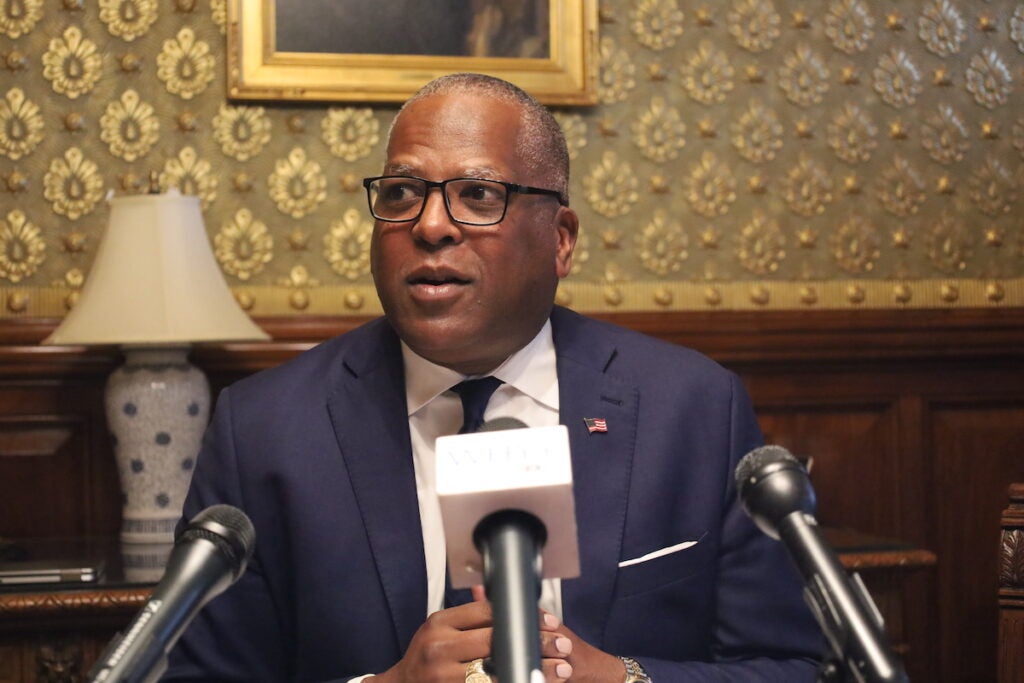
He said other highlights will be working on improving housing opportunities especially for those in disadvantaged communities such as Philadelphia.
‘Tax fairness’
Jared Bernstein, chair of the Council of Economic Advisers, spoke about the administration’s efforts on what they are calling “tax fairness” — how President Biden is working to bring back programs to help those in need while reducing living costs for lower- and middle-income families.
That includes “affordable child care, affordable housing, making sure people have what they need and some breathing room to get ahead,” Bernstein told WHYY News.
From Philly and the Pa. suburbs to South Jersey and Delaware, what would you like WHYY News to cover? Let us know!
Meanwhile, the president “guaranteed that taxes on those under $400,000 of income or adjusted gross income would not go up,” he said. The president is “making sure our tax system has a lot more fairness in it, so the wealthy and the corporate sector are paying their fair share, which is something that is not too often the case now.”
Whether the concept of tax fairness will have any traction in a Republican-dominated House will be seen during budget talks.
Prescription drug pricing
In his State of the Union address last year, Biden announced his plan to reduce health care costs. This year, he will claim a victory on the front, pointing to his signature Inflation Reduction Act, which limits the out-of-pocket expenses seniors have to pay as part of the Medicare program.
Under the new law, beneficiaries will no longer need to pay the 5% coinsurance charges for expenses exceeding the catastrophic coverage limit. In 2024, the cap for out-of-pocket expenses is set at $3,500, and starting in 2025 the cap will be set at $2,000.
Neera Tanden, director of the United States Domestic Policy Council at the White House, told WHYY News the IRA is already providing significant benefits for older Pennsylvania residents.
“That means that 829,000 Pennsylvanians will save an average of $466 and 79 cents a year,” she said. “And that’s 387 million in savings that are back in the pockets of Pennsylvanians.”
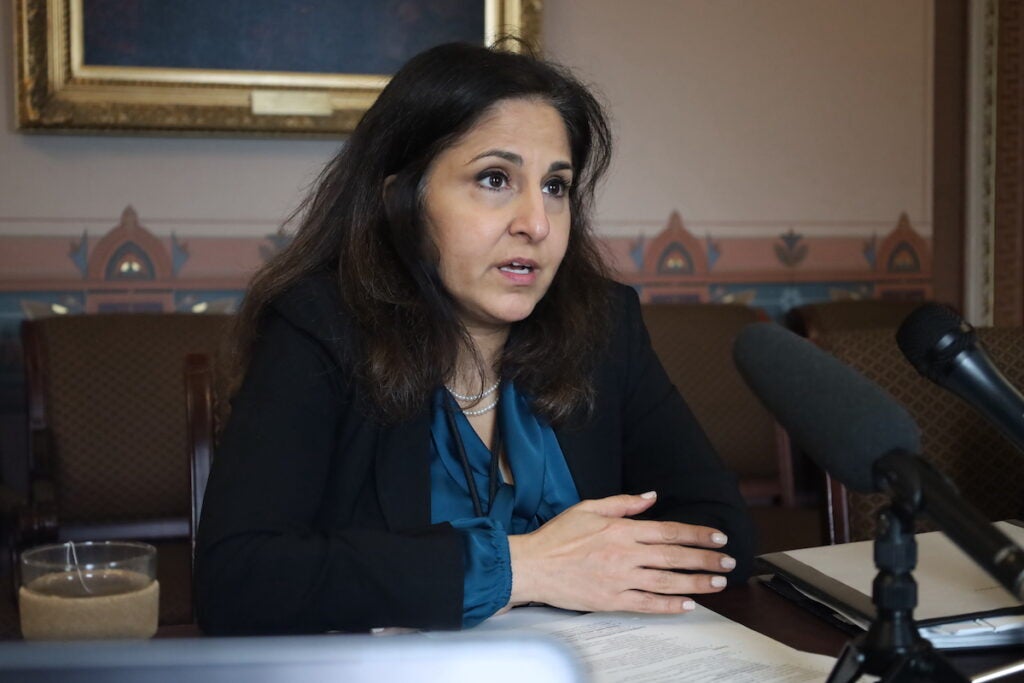
The IRA also gives the government the authority to negotiate drug prices directly with their manufacturers. The president is also likely to announce that 10 pharmaceutical companies made counteroffers just this week. Health and Human Services Secretary Xavier Becerra called that an early success in the negotiations.
“I can guarantee you that the price of the drugs that they sell today will not be the price that we negotiate by September,” he said.
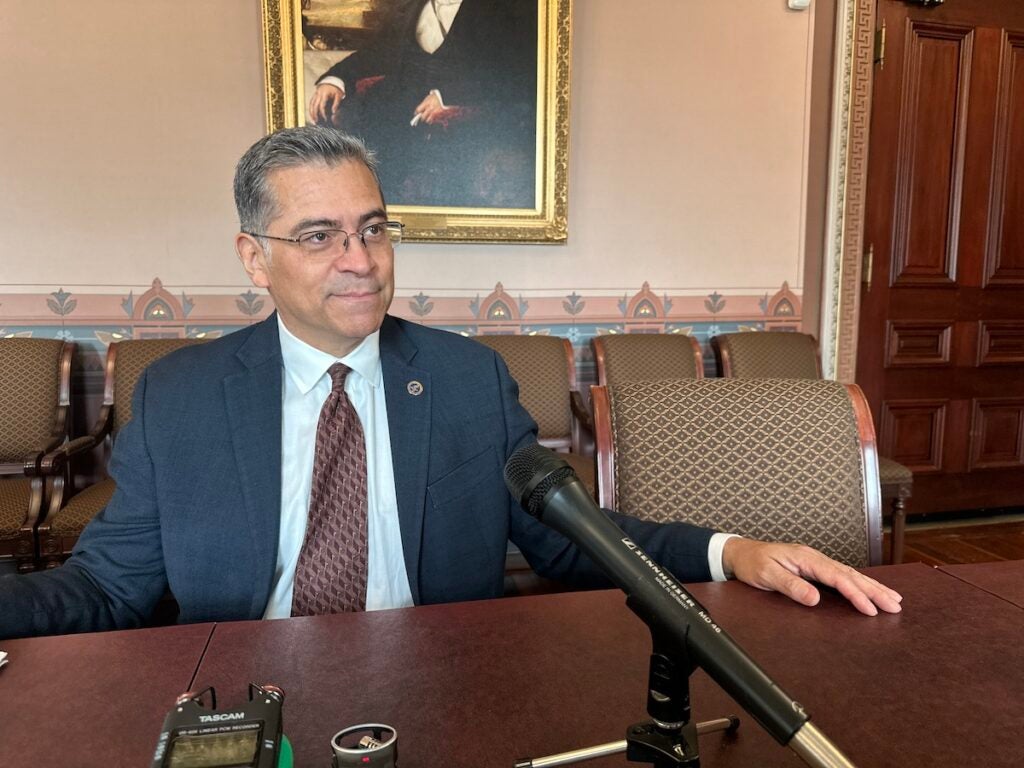
Reproductive health rights
With the Supreme Court’s overturning of constitutional protections for abortion, it’s not surprising that the White House is highlighting reproductive health care in this election year and the president is expected to bring it up during his address to Congress. To further accentuate the point, Democrats are inviting fertility doctors, IVF patients and women from Republican-led states who were denied abortions — including ones considered life-saving — as special guests to the State of the Union session.
While abortion continues to be legal in the Keystone State post the Dobbs decision which overturned Roe v. Wade, Kate Keith, deputy director at the White House Gender Policy Council, told WHYY News that it should still be on the minds of Pennsylvania voters.
“Congress have proposed three national abortion bans,” she said. “So no one should rest on their laurels that their state does not yet have an extreme abortion ban.”
She also pointed out that a lawsuit over mifepristone may significantly reduce access to the commonly-used abortion pill. The Supreme Court has taken up the case and will hear arguments on March 26, with a ruling expected in the summer.
“We are fighting tooth and nail to defend FDA’s independent authority here to approve and regulate drugs,” she said. “If this lawsuit is successful, that would limit access everywhere, including in a state like Pennsylvania.”
Gun violence, the opioid crisis and the ‘Unity Agenda’
In his 2022 State of the Union address, President Biden introduced what he called the “Unity Agenda,” a set of bipartisan policy priorities aimed at bringing Americans together across party lines to address key challenges facing the nation. These include the gun violence and opioid epidemics, advancing cancer research, improving mental health care and increasing support for individuals with disabilities.
“The Unity Agenda is the president’s leadership in solving problems that are affecting all Americans’ problems that unify us because we are all suffering from them,” Rob Wilcox, deputy director of the White House Office of Gun Violence Prevention, told WHYY News. “If it’s the mental health of our adults or more often our kids who’ve just come through COVID, if it’s the opioid addiction that’s ravaging our cities, our countryside, or if it’s gun violence, the president has made a clear commitment that we are going to invest in people.”
A key plank of the agenda is hiring and training 14,000 new school-based mental health workers to combat gun violence and substance abuse.
“We’re suffering from one of the largest crises in youth mental health of our time coming out of the COVID-19 pandemic,” Gregory Jackson Jr., also deputy director for the Office of Gun Violence Prevention, said. “Youth are in crisis, and when they have a firearm or access to a firearm, that’s a recipe for disaster.”
Wilcox added that the White House is also looking to reduce the inflow of illicit drugs and reduce access to firearms among those determined to have mental health issues.
Junk fees
President Biden is also likely to officially announce what the White House is calling a “new strike force” to crack down on what they say is unfair and illegal pricing. This includes so-called “junk fees” which cost consumers an estimated $90 billion each year.
Kirabo Jackson, who sits on the president’s Economic Policy Council, includes “hidden fees” in those junk fees. For example, the price posted on a shopping and travel website is not the final price as additional fees are added during the process. Jackson says that consumers end up spending more than they would have but these fees also have negative economic effects because companies — especially small businesses — find it harder to compete on price.
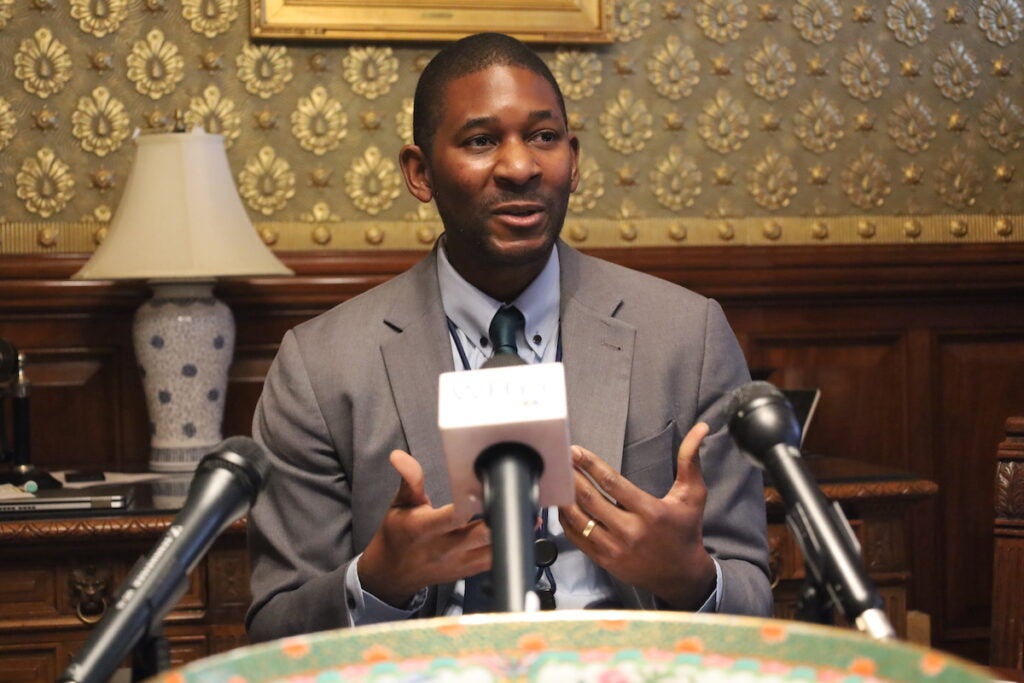
“Getting rid of those junk fees is good for the pocketbooks of everyday Americans, but also it makes for a more competitive environment,” he told WHYY News.
Jackson pointed out that companies like AirBnB have already started providing upfront prices because of the White House’s efforts.
Small business opportunities
In January, the president visited Emmaus, Pa., to tout the rise in small business applications. Isabella Casillas Guzman, who heads up the Small Business Administration, says that this focus on small business will be an important part of the president’s address to the joint session of congress.
“We’ve seen our economy perform and outperform other leading global economies in terms of our recovery post COVID,” she told WHYY News. “And that’s been in big part due to the fact that there’s been such a small business boom, there’s 16-and-a-half million new business applications filed around the country and nearly half-a-million in Pennsylvania as well.”
Guzman says that the administration sees small business as a foundation for economically healthy communities, particularly in Black and brown communities.
“Obviously fighting to ensure that we can continue to build up the middle class and that includes our Main Street small businesses, all those mom-and-pop shops which are small, employer-run operations,” Guzman said. “We’re continuing to see that trend with the doubling of the number of households that have businesses in the Black community and Latino community,” she said. “It’s the highest in 10 years.”
Part of the speech, Guzman said, will be to encourage people to build small businesses so the economy can grow from the middle out and bottom up.
Rural investment
The president is likely to talk about billions of dollars in new projects intended to “advance rural prosperity, economic development, competition and sustainability.” This includes funding to support the adoption of climate-smart agriculture practices which, they say, will benefit the environment while also reducing costs for farms and ranches and adding to their revenue streams.
Will McIntee, national rural engagement director, said that even money dedicated to suburban and rural areas will have an impact on major cities. For example, money given to farmers for faster and easier internet connection through infrastructure funding will help lower the cost of milk and eggs, as the farmers use technology to make their farms more efficient.
McIntee explained that American Rescue Plan investments were designed to solve supply chain issues while also ensuring farmers and ranchers can take home a greater share “for the hard work they do to produce our food.”
“The investments we’re making in safe roads and bridges or freight rail investments and port investments help to support our urban centers but also support the American farmer and rancher to ensure that there’s easier access to ports and easier access to markets abroad,” he said.
That in turn makes it cheaper for all people to buy the food produced in the U.S., McIntee said.
The environment
The president will also likely promote the Bipartisan Infrastructure Law, which provides funding for local communities. These investments have a twin goal of improving local infrastructure while reducing old and inefficient systems that have negative environmental outcomes such as emissions that exacerbate climate change.
For example, the School District of Philadelphia received a grant of nearly $8 million from the Environmental Protection Agency to double its electric bus fleet. The EPA and Governor Josh Shapiro also announced $200 million to replace water pipes in Pennsylvania to improve the quality of drinking water. Pennsylvania is also expected to receive more than $171 million in federal funding to expand EV charging across the state.
“I think we’ve been trying to say all along that we obviously are making a transition that, from a climate change perspective, science is telling us is necessary,” said Brenda Mallory, chair of the White House Council on Environmental Quality.
She added that updating older infrastructure is key to tackling environmental concerns but also a way of ensuring that workers in outdated industries — such as coal and gas — are not left out.
“What are we able to do to create the economic base for those folks in the future? What are we able to do to deal with the public health issues that we’re trying to balance as well as prepare for the economy going forward? I think his message has been, we see you and we’re trying to make this work in a way that benefits all,” Mallory said.
Editor’s note: A previous version of this story misidentified Jared Bernstein as the chair of the Economic Policy Institute.

Get daily updates from WHYY News!
WHYY is your source for fact-based, in-depth journalism and information. As a nonprofit organization, we rely on financial support from readers like you. Please give today.


